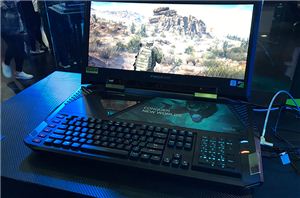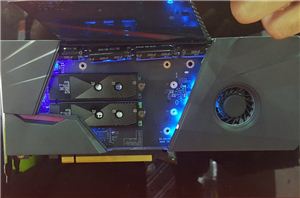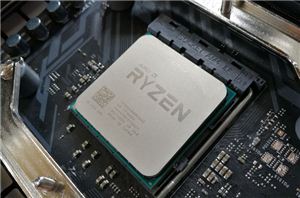MSI Optix MAG491C Hands-On: A 49-Inch 32:9 LCD with FreeSync
by Anton Shilov on June 22, 2018 2:00 PM EST
Earlier this month MSI demonstrated its ultrawide curved 49-inch gaming display at Computex. The unit uses a mass-produced panel and already has a model number, so its launch is imminent. Apparently, just like ASUS and Samsung, MSI believes that ultrawide displays with a 32:9 aspect ratio are going to become popular among gamers going forward.
The specifications of MSI’s Optix MAG491C are pretty straightforward: the LCD is based on Samsung’s 49-inch curved VA panel featuring a 3840×1080 resolution, a 400 nits brightness, a 3000:1 contrast ratio, an 1800R curvature, a 4 ms GtG response time, and a 144 Hz maximum refresh rate. However while Samsung appears to be supplying the panel, we've seen no sign that the company is offering quantum dot-enhanced backlighting technology to other makers. As a result, ultrawide monitors from ASUS and MSI are shipping with narrower color gamuts than what we've seen in Samsung's own products.
Meanwhile in terms of features and connectivity, MSI’s ultrawide gaming monitor supports AMD’s FreeSync dynamic refresh rate as well as comes with VESA’s DisplayHDR400 badge. Input is provided by three HDMI 2.0 ports as well as a DisplayPort 1.2 connector.
When I visited MSI’s booth earlier this month, I tried to play a couple of racing games (including a Formula 1 game) on this 49-inch ultrawide display and can confirm that everything feels extremely impressive with a very wide field of view. It is still not like driving a real car, but it is significantly better than gaming on a 16:9 LCD. A wide FOV and an ability to turn your head to observe surroundings are among the key features of VR headsets. To a certain degree, 49-inch displays allow to do the same, but without motion sickness and other negative effects.
That said, ultrawides still have a room to grow: to become taller and even wider, but even existing models perform rather well in games that actually support their ultrawide resolution (which many consider an odd resolution that does not work in all games). Still, because of experiences like these, it's not surprising to see companies like ASUS and MSI pursuing these designs and offering them to their customers.
Meanwhile, there are other reasons why the two renowned gaming brands might want to launch their 49-inchers this summer. Samsung is the only company to offer 32:9 panels right now and it plans to expand the lineup in the coming months (according to TFTCentral). Therefore, by launching their 49-inchers this summer, ASUS and MSI will not only address a potentially lucrative market segments, but will also learn more about demands of their clients, and will get experience with ultrawide panels from Samsung, which will be important if they decide to expand their lineups of ultrawide LCDs.
MSI yet has to price its unit and set the launch date, but expect the product to hit the market in the coming weeks or months. As for pricing, Samsung’s CHG90 is available for around $1000 from Amazon today, so expect 49-inchers from ASUS and MSI to be cheaper because of the lack of FreeSync 2 and QLED backlighting.
Related Reading:
- ASUS Launches VG49V: An Ultrawide Curved 32:9 49-Inch FreeSync LCD
- Philips Readies Curved Ultra-Wide 492P8 Display: 49”, 32:9, USB-C, Sub-$1100
- Samsung Announces First Freesync 2 Monitors: CHG70 & CHG90 - Quantum Dots, Up to 49”, 144 Hz, DCI-P3
| Want to keep up to date with all of our Computex 2018 Coverage? | ||||||
 Laptops |
 Hardware |
 Chips |
||||
| Follow AnandTech's breaking news here! | ||||||












16 Comments
View All Comments
SodaAnt - Friday, June 22, 2018 - link
In this day and age when I can buy a 50in HDR 4k TV for $220, can we at least get these things to have 1440p instead of 1080p?boeush - Friday, June 22, 2018 - link
Not as big (*only* 38"...):https://www.dell.com/en-us/work/shop/dell-ultrasha...
But:
Native Resolution
3840 x 1600 at 60 Hz
Personally, I'd like at least a full 4K (3840x2160) and in a larger form-factor (more like 45") - but this DELL is the closest to my goal, at present. I'm still waiting for that perfect one, though :-)
Psycho_McCrazy - Saturday, June 23, 2018 - link
My wish list item too!!!!Diji1 - Saturday, June 23, 2018 - link
HDR is a bit misleading on cheap TVs, you are getting the ability to have HDR input without outputting it correctly.nathanddrews - Sunday, June 24, 2018 - link
That comment is also a bit misleading due to the fact that most HDR content is produced with color and brightness levels that exceed the capabilities of even the most expensive TVs. So you just have to decide what level of tone mapping and clipping is acceptable to your eyes (and your wallet). There are some inexpensive TVs that perform pretty well, especially the 2018 models.Diji1 - Sunday, June 24, 2018 - link
Did you bought a shitty HDR TV?close - Monday, June 25, 2018 - link
nathanddrews is perfectly right while also managing to not mangle the English language.Eliminating every HDR TV "outputting it correctly" would leave you all but staring out the window. I have a 3500E TV and I can tell you it's really not perfect. But then again the only people who would care are the ones making misleading "academic" comments and people coming fast from behind to replace "audiophiles" in the snake-oil "I can tell the difference" category.
imaheadcase - Monday, June 25, 2018 - link
Not this comment again..TV are completely different that a PC monitor. Not even comparable. 4k panel on a TV is going to be so cheap vs a monitor you can't compare.vanilla_gorilla - Monday, June 25, 2018 - link
That's a pretty broad statement. All monitors and all TV are "completely different" ? You might want to provide some evidence to support your claim.AlexByrth - Friday, March 22, 2019 - link
Of course, you also don't have arguments to prove your points.